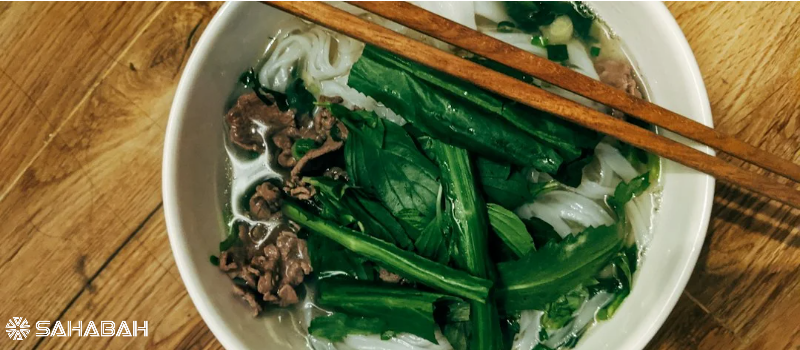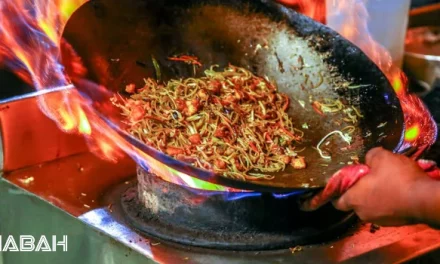Pho is a warming Vietnamese noodle soup that has become popular worldwide for its complexly flavored broth, tender rice noodles, and variety of meat and vegetable toppings. However, with Pho often containing beef and chicken, a common question asked, especially among Muslim diners, is “Is Pho halal?”
In this comprehensive guide, we cover everything you need to know about Pho and meeting halal compliance, including typical ingredients, how it’s prepared, risks of cross-contamination, and tips for finding or making certified halal Pho.
Whether you are Muslim and want to enjoy this iconic Vietnamese dish without breaking any religious guidelines, or are simply seeking vegetarian Pho options, read on for full details that will leave all your questions answered!
What is Pho and What Makes Food Halal?
Before determining if Pho meets halal standards, let’s make sure we all understand exactly what this noodle dish is and what requirements designates something as halal appropriate:
What is Pho?
Pho is a Vietnamese soup consisting of flavorful broth, rice noodles called bánh phở, herbs, vegetables, and different protein options. Here are the primary components that make up a steaming bowl of pho:
Broth: The foundation of pho is the bone broth, made by simmering beef, chicken or even pork bones for many hours with warm spices like cinnamon, star anise and fennel. The broth can also be vegetable-based.
Rice noodles: Long, flat and delicate noodles made solely from rice flour and water. They are tender yet slightly chewy. You can also find pho made with chicken egg noodles on occasion.
Protein: Popular proteins cooked in the broth include beef (typically brisket or steak), chicken, pork, shrimp or sliced eggs. Some vegetarian versions will have deep-fried or fresh tofu.
Herbs and Vegetables: Fresh ingredients like bean sprouts, basil, cilantro, lime wedges and chili peppers allow you to customize spice and flavor. Condiment plates can include extras like hoisin sauce, sriracha and vinegar infusions as well.
Now that we understand the various components that define a Pho dish, let’s explore what guidelines make something permissible to eat under Islamic law.
What Makes Food Halal?
The word “halal” in Arabic means “permissible”. For food to be certified Halal, it must adhere to the following religious requirements:
- Cannot contain pork or pork by-products in any form, including bacon, ham or lard
- No alcohol can be used as an ingredient
- Halal meat and poultry must come from animals slaughtered via Islamic ritual methods (known as zabihah), which includes reciting a prayer while the animal is killed quickly with the intention that is for consumption to feed humans
- Animals must be treated humanely and never given hormones or antibiotics
- Meat and dairy ingredients should be clearly segregated during preparation, cooking and serving to avoid cross-contamination
As long as all the above criteria are satisfied, then the food can rightfully earn a halal certification badge signifying it aligns with Muslim dietary regulations and is permissible to eat within those guidelines.
Are Typical Pho Ingredients and Components Halal?
Now that we understand what makes Pho such a uniquely enjoyable dish and what designates food as halal compliant, let’s break down the most common Pho ingredients and whether they adhere to halal standards on their own:
Pho Broth
Pho broth (nước phở) is made by simmering bones and aromatics for many hours to extract deep, penetrating flavors. This base can be crafted from:
-
Beef bones: Using bones like oxtail or knuckle are very typical and result in a rich, meaty broth. Halal if the beef is certified halal.
-
Chicken carcasses: Whole chickens or just chicken bones also create an intensely flavored Pho base. Halal if properly slaughtered.
-
Pork bones or trotters: Some cooks will also use pork bones/trotters or even just pork meat to make the broth. Not halal.
-
Vegetable broth: Mushroom broth or water infused with aromatics makes a lighter, cleaner vegetarian Pho base suitable for vegans as well. Halal.
Rice Noodles (bánh phở)
The tender yet slightly chewy rice noodles are made solely from rice flour and water. Halal by nature and ingredients. They can also contain some tapioca or sweet potato flour at times.
Herbs and Spices
Many warm spices and fresh, lively herbs are used to add layers of aroma and flavor. Common seasonings include:
- Star anise, cinnamon, fennel, coriander, ginger, shallots: Halal
- Optional ingredients like MSG, oyster sauce: Varies depending on specific additive ingredients
Protein Toppings
- Thinly sliced beef (typically brisket or steak cuts): Can be halal if coming from a halal certified supplier and avoiding cross-contamination.
- Chicken – breast or thigh meat usually: Can be halal with correct sourcing.
- Pork belly, shoulder, jowls, feet or ears: Not halal
- Shrimp: Mostly halal depending on school of thought.
- Eggs: Halal as long as chickens are free-range and fed proper feed.
- Fried or fresh tofu: Halal
So upon initial examination, we can see many common Pho components like the beef or chicken broth, rice noodles, herbs, spices and some proteins can potentially meet halal qualification on their own depending on sourcing and preparation.
However, because Pho is customarily made in bulk batches and requires hours of simmering, the likelihood for cross-contamination is quite high in most standard Vietnamese restaurant scenarios. So further analysis on actual cooking methodology and serving processes is warranted.
How Pho is Traditionally Prepared and Risks of Cross-Contamination
To unlock all the flavor magic that makes Pho such a legendary dish, some very specific preparation techniques are involved. Here is a closer look at common Pho cooking methods and where risk of cross-contamination can enter the picture:
Homemade beef or chicken bone broth: Most Vietnamese cooks will simmer actual beef or chicken bones for 6-12+ hours, skimming fat and impurities continuously. The bones release collagen, marrow, minerals and proteins into the simmering liquid to form the base broth, also known as “nước phở”. If ONLY certified halal beef is used with designated equipment, this would remain halal. However many cooks use whatever beef bones are most accessible and affordable, including non-halal.
Broth spices: During broth simmering, warm spices like star anise, coriander seed, fennel seed and cinnamon sticks infuse the liquid with aromatic richness. Halal on their own.
Stock pots and cooking equipment: At most restaurants, gigantic stock pots are used to make large batches of bone broth in the backs of kitchens. These huge pots often simmer bones and scraps from whatever beef, pork or chicken is available, combining all forms of animal product into one bubbling base. The same large metal strainers, ladles, skimmers may also be shared across cooking all varieties of Pho broth. When equipment is commonly shared across halal and non-halal ingredients, risk of contamination through traces is extremely high.
Ingredient storage and preparation: Raw proteins like raw beef, pork, chicken and shrimp ingredients tend to be stored in close proximity before pre-prep and cooking. Cutting boards, knives, preparation counters, storage containers may be freely interchanged before proteins are added into Pho dishes during final service. Without clear and strict separation protocols of all materials, cross-contamination can easily occur.
Serving process: At order or self-serve stations, the same sets of tongs and ladles are often shared across proteins, broths and garnishes like spices and herbs. Reusing the same servingware continuously increases odds that traces of non-halal pork or beef get into Halal peering dishes. Servers also commonly prepare multiple orders simultaneously with shared tooling.
As you can see, there are lots of risks that non-Halal meat or broth residues can inadvertently mix into Halal Pho orders through standard, large scale restaurant production and serving habits.
The Verdict – Is Pho Really Halal?
Given the high likelihood of cross-contamination from most kitchen procedures and serving habits described above, standard restaurant Pho is generally assumed to be non-Halal unless explicitly proven otherwise with certification.
Here are the main culprits contributing to non-halal restaurant Pho status:
✘ Broths often combine bones/scraps from multiple animal sources in same pots
✘ Shared kitchen tools and surfaces enable meat/broth residues to transfer
✘ Servers use same tongs, strainers, ladles for diverse ingredients ✘ No guarantee all proteins were properly zabihah slaughtered
Bottom line – when ordering Pho at a standard Vietnamese eatery with no clear halal designation, assume that it does not satisfy Islamic dietary restrictions unless you get crystal clear answers directly from management on their specific production methods and ingredients confirming otherwise.
The only true way to guarantee you are getting Halal compliant Pho is if the restaurant can provide certification from a validating third party halal organization that has inspected their specific facility and processes. And even with certification posted, asking questions directly before ordering never hurts, especially if you have serious dietary restrictions.
How to Find and Order Authentic Halal Certified Pho
Luckily, options for enjoying delicious Halal Vietnamese beef noodle soup are growing as awareness and demand increases globally among Muslim communities. Here are expert tips for locating and customizing a steaming bowl of authentic Halal pho to match your preferences:
Check Restaurant Certification Credentials
A halal certification badge displayed prominently at the restaurant entrance is the first clue to finding compliant Vietnamese fare. This indicates all menu items adhere to halal preparation protocols. Top global Halal certification organizations include:
- Halal Transactions of Omaha
- Islamic Food and Nutrition Council of America (IFANCA)
- The Islamic Society of Washington Area (ISWA) Halal Certification
- Halal Monitoring Committee
Calling ahead to double check certification status if no sticker or emblem is visible is wise. Any restaurant able to prove current halal certification should have appropriate procedures to avoid cross-contamination with alcohol, pork or improper meat processing.
Ask Questions About Sourcing and Cooking Methods
If enjoying Pho at a restaurant that follows halal practices but is not officially certified, don’t be shy about asking questions to inquire exactly how their Pho and other menu items are made. Key things to ask would include:
✅ What type of bones (beef, chicken, pork) are used for Pho broth? ✅ Where is the beef and chicken sourced from? ✅ What is done to prevent cross-contamination of ingredients? ✅ Do staff use the same strainers, tongs and ladles on Halal and non-halal orders?
Get as much detail as possible before placing an order to truly understand their supply chains and kitchen protocols. If management seems elusive or unsure on specifics, proceed with high caution.
Pick a Vegetarian “Pho Chay” Option
The easiest method to avoid any risk of cross-contamination is to order Pho Chay, also sometimes called Pho Vegetarian or Pho Veggie. Broth bases are prepared separately from meat versions, typically using mushroom broth or non-bone based stocks like kombu (seaweed) or vegetables only. Popular meatless protein options include fried organic tofu or yuba (tofu skin sheets). Toppings can mimic meat with ultra-thin sliced mushrooms like Enoki, green onions and flavor-packed sauces. This allows peace of mind regarding whether contamination occurred.
How to Prepare Delicious Halal Certified Pho at Home
If you want guaranteed Halal Pho made exactly how you like, another fantastic option is making it yourself in your own kitchen!
Here is a quick guide to preparing completely customized and 100% Halal compliant Vietnamese pho bowls at home from scratch:
Source Halal Certified Ingredients
- Beef bones & meat: Use only certified Halal beef products, ideally with the seal visible on packaging
- Chicken: Purchase whole fresh zabihah or halal chickens
- Seasonings & aromatics: Choose MSG-free spices without alcohol. Double check packaged items.
Cook in Designated Cookware
- Pot, utensils & surfaces: Use a separate, devoted pot and cooking utensils just for halal dishes
- Serving bowls and plates: Have a special set aside just for your halal meals
Control All Aspects
By preparing your own pho, you are in charge the entire process from selecting quality halal ingredients to serving your freshly crafted broth and noodles without concerns. Customize away!
While making pho broth does requires several long hours simmering bones, the hands-on process only takes about 1-2 hours total. Fully homemade allows flexibility to experiment with alternate bases like mushroom or vegetable only broths as well. Check out my Halal Pho Recipe for everything you need to DIY delcious Vietnamese noodle soup at home guaranteed 100% halal.
So for those wanting to fully control ingredients plus recipe customization, crafting Halal certified pho broth bowls from your own kitchen ensures peace of mind while allowing for personal preference flexibility as well.
The Takeaway – Exploring Delicious Halal Pho is Possible
While traditional restaurant Pho is generally presumed to be non-compliant from a Halal perspective due to high probability of cross-contamination, no longer does this iconic Vietnamese dish have to be avoided. We covered certification checking, asking deep questions directly plus vegetarian ordering tips that empower you to make informed choices for safely enjoying Pho without compromising beliefs or dietary needs.
Additionally, more eateries focused on honoring Halal standards continue emerging worldwide, from Asia to America and beyond. These provide even greater access to orders prepared in certified facilities backed by third party inspection.
Or for ultimate control and personalization, creating custom Halal Pho broths and favorite veggie to meat toppings at home lets you craft every component just how your family loves.
We hope this guide gives you confidence to either discover or prepare steaming Halal certified bowls of pho. Now filled with knowledge on what it takes to classify ingredients, processes and eateries as genuinely Halal compliant, see what new authentic Vietnamese flavors await your exploration!
FAQ: Is Pho Halal?
The halal status of pho can vary depending on the ingredients and preparation. It’s important to check with the specific restaurant to confirm if their pho is halal.
Can I find halal pho in New York City?
Yes, there are several halal restaurants in New York City that serve pho. You can check online platforms or review websites to find the top 10 best halal pho options in the city.
Are there any halal pho options in Houston, TX?
Yes, there are halal pho options available in Houston, TX. You can use online search tools or review platforms like Yelp to find halal pho restaurants in the area.
How can I determine if a pho dish is halal?
To verify the halal status of a pho dish, it’s best to inquire with the restaurant directly. They can provide information about the ingredients and their halal certification, if applicable.
What are the popular halal pho menu items?
Popular halal pho menu items may include various types of pho with halal-certified meats, as well as vegetarian broth options for those seeking halal choices.
Can I purchase halal pho for takeout?
Many halal pho restaurants offer takeout options. You can contact the restaurant or check their online platforms to see if they provide takeout services for halal pho.
Is there a specific year when the demand for halal pho increased?
The demand for halal pho has been steadily increasing over the years, with more restaurants catering to halal dietary preferences. The popularity of halal pho continues to grow, especially in major cities.
Are there any famous halal pho establishments in the USA?
There are renowned halal pho restaurants across the USA, including in cities like New York, Houston, and others. These establishments are known for their commitment to serving quality halal pho dishes.
What are the trending searches related to halal pho?
Trending searches related to halal pho may include phrases like “10 best halal pho near me,” “halal pho in New York,” and “find halal pho in Houston, TX,” among others.
How can I identify a halal restaurant that serves pho?
You can identify halal restaurants that serve pho by looking for halal certification, reviews from other halal diners, or by contacting the restaurant directly to inquire about their halal options.





